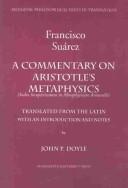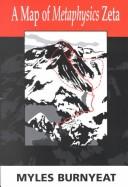Book
ISBN: 8845259927 9788845259920 Year: 2007 Publisher: Milano: Bompiani,
Abstract | Keywords | Export | Availability | Bookmark
 Loading...
Loading...Choose an application
- Reference Manager
- EndNote
- RefWorks (Direct export to RefWorks)
Aristotle. --- Commentaries. --- Metaphysics --- Aristotle --- God --- Ontology --- Philosophy --- Philosophy of mind --- Aristoteles. --- Aristotle - Metaphysics
Book
ISBN: 9780199588350 019958835X 019172887X 9786613422705 1283422700 019161825X Year: 2011 Publisher: Oxford Oxford university press
Abstract | Keywords | Export | Availability | Bookmark
 Loading...
Loading...Choose an application
- Reference Manager
- EndNote
- RefWorks (Direct export to RefWorks)
The idea that some parts of reality are fundamental and others derivative was an important one in Aristotle's philosophical system, and is now again of interest in philosophy. Peramatzis presents an account of priority relations in Aristotle's metaphysics, and draws out their continuing philosophical significance.
Priority (Philosophy) --- Antériorité (Philosophie) --- Aristotle. --- Antériorité (Philosophie) --- Philosophy --- Aristoteles. --- Aristotle. - Metaphysics
Book
ISBN: 8883740033 9788883740039 Year: 2000 Publisher: Cagliari Ed. AV
Abstract | Keywords | Export | Availability | Bookmark
 Loading...
Loading...Choose an application
- Reference Manager
- EndNote
- RefWorks (Direct export to RefWorks)
Metaphysics --- Aristotle --- God --- Ontology --- Philosophy --- Philosophy of mind --- Aristotle. --- Aristotle - Metaphysics - Book 12

ISBN: 0874622433 9780874622430 Year: 2006 Volume: 40 Publisher: Milwaukee Marquette university press
Abstract | Keywords | Export | Availability | Bookmark
 Loading...
Loading...Choose an application
- Reference Manager
- EndNote
- RefWorks (Direct export to RefWorks)
Metaphysics --- God --- Ontology --- Philosophy --- Philosophy of mind --- Aristotle. --- Aristoteles. --- Metaphysics. --- Aristotle. - Metaphysics.
Book
ISBN: 9780199682980 0199682984 9780199682997 0199682992 Year: 2018 Publisher: Oxford Clarendon Press
Abstract | Keywords | Export | Availability | Bookmark
 Loading...
Loading...Choose an application
- Reference Manager
- EndNote
- RefWorks (Direct export to RefWorks)
The Clarendon Aristotle Series is designed for both students and professionals. It provides accurate translations of selected Aristotelian texts, accompanied by incisive commentaries that focus on philosophical problems and issues. The volumes in the series have been widely welcomed and favourably reviewed. Important new titles are being added to the series, and a number of well-established volumes are being reissued with revisions and/or supplementary material. Laura M. Castelli presents a new translation and comprehensive commentary of the tenth book (Iota) of Aristotle's Metaphysics, which provides Aristotle's most systematic account of what it is for something to be one, what it is for something to be a unit of measurement, what contraries are, and what the function of contraries is in shaping the structure of reality into genera and species. There are some objective difficulties in making sense of Iota as a part of the Metaphysics and as a piece of Aristotelian philosophy. Castelli's Introduction tackles such general difficulties, while the commentary provides a detailed analysis of the arguments, of the more specific issues and of the philosophical points emerging from Aristotle's text. The English translation, based on Ross' critical edition, is meant as a tool for readers with or without knowledge of ancient Greek. The Clarendon Aristotle Series is designed for both students and professionals. It provides accurate translations of selected Aristotelian texts, accompanied by incisive commentaries that focus on philosophical problems and issues. The volumes in the series have been widely welcomed and favourably reviewed. Important new titles are being added to the series, and a number of well-established volumes are being reissued with revisions and/or supplementary material. Laura M. Castelli presents a new translation and comprehensive commentary of the tenth book (Iota) of Aristotle's Metaphysics, which provides Aristotle's most systematic account of what it is for something to be one, what it is for something to be a unit of measurement, what contraries are, and what the function of contraries is in shaping the structure of reality into genera and species. There are some objective difficulties in making sense of Iota as a part of the Metaphysics and as a piece of Aristotelian philosophy. Castelli's Introduction tackles such general difficulties, while the commentary provides a detailed analysis of the arguments, of the more specific issues and of the philosophical points emerging from Aristotle's text. The English translation, based on Ross' critical edition, is meant as a tool for readers with or without knowledge of ancient Greek. --
Metaphysics --- Aristotle. --- Metaphysics (Aristotle) --- Philosophy, Ancient --- Metaphysics - Early works to 1800 --- Aristotle. - Metaphysics. - Book 10
Book
ISBN: 9782130829362 2130829368 Year: 2021 Publisher: Paris : Presses Universitaires de France,
Abstract | Keywords | Export | Availability | Bookmark
 Loading...
Loading...Choose an application
- Reference Manager
- EndNote
- RefWorks (Direct export to RefWorks)
Le livre Bêta de la Métaphysique examine une quinzaine d'apories consacrées à la science première, à la réalité, à l'être, aux principes qui constituent toutes choses. Ce sont des difficultés, dont Aristote soutient que l'on ne pourra philosopher convenablement, selon les termes du programme qu'il a établi dans le livre Alpha, qu'en les examinant minutieusement. Non pas simplement en leur apportant une réponse, comme d'autres ont pu le faire avant lui, mais en étudiant la manière dont des penseurs ont abordé ces difficultés et dont ils en ont fait des problèmes, avec plus ou moins de succès. La philosophie, montre Aristote en faisant dialoguer et se confronter des opinions philosophiques opposées, trouve son excellence dans son aptitude à poser les bonnes questions et à forger les problèmes à même de satisfaire le désir de connaissance qui est le propre de notre nature.
Aristote, --- Aristotle --- Aristotle - Metaphysics --- Métaphysique --- Aristotélisme --- Aporie --- Aristote (0384-0322 av. J.-C.). --- Metaphysics --- Aporia --- Aristotle.
Book
Year: 1967 Publisher: Frankfurt: Minerva,
Abstract | Keywords | Export | Availability | Bookmark
 Loading...
Loading...Choose an application
- Reference Manager
- EndNote
- RefWorks (Direct export to RefWorks)
Book
ISBN: 3487075598 9783487075594 Year: 1984 Volume: 42 Publisher: Hildesheim Olms
Abstract | Keywords | Export | Availability | Bookmark
 Loading...
Loading...Choose an application
- Reference Manager
- EndNote
- RefWorks (Direct export to RefWorks)
Classical Greek language --- Classical Greek literature --- Aristotle --- Metaphysics --- Indexes --- -God --- Ontology --- Philosophy --- Philosophy of mind --- Aristoteles --- Indexes. --- -Indexes --- Aristote --- Aristotile --- Aristotle. --- Concordances --- God --- Aristoteles. --- Concordances. --- Metaphysics - Indexes --- Aristotle - Metaphysics - Indexes --- Aristotle - Metaphysics
Book
ISBN: 9789042920132 9782758400042 2758400049 9042920130 Year: 2008 Volume: *18 Publisher: Louvain-la-Neuve Peeters
Abstract | Keywords | Export | Availability | Bookmark
 Loading...
Loading...Choose an application
- Reference Manager
- EndNote
- RefWorks (Direct export to RefWorks)
Aristotle --- Logic, Ancient --- Logique ancienne --- Religion --- Contributions in logic --- Aristotelian philosophy --- Criticism --- Aristotle. --- Religion. --- Contributions in logic. --- Theology --- Aristotle - Metaphysics

ISBN: 093522503X 9780935225037 Year: 2001 Publisher: Pittsburgh : Mathesis,
Abstract | Keywords | Export | Availability | Bookmark
 Loading...
Loading...Choose an application
- Reference Manager
- EndNote
- RefWorks (Direct export to RefWorks)
Aristotle's Metaphysics Zeta has been aptly described as the Mount Everest of ancient philosophy. Many are detered by its difficulty. For others, the difficulty is a challenge they cannot resist. This map is designed to help all parties find their way.
Metaphysics --- Philosophy, Ancient --- Métaphysique --- Philosophie ancienne --- Aristotle. --- Aristoteles. --- Aristoteles --- Aristote --- Aristotle --- Aristotile --- Métaphysique --- Metaphysics (Aristotle) --- Aristotle. - Metaphysics. - Book 7

 Search
Search Feedback
Feedback About UniCat
About UniCat  Help
Help News
News